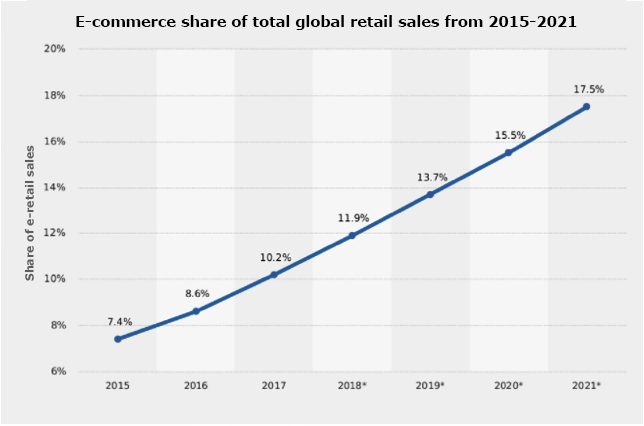The top trending business field to be in is the eCommerce Business. This has evidently become a successful business especially during this current pandemic situation as well. The one business which saw great profits is none other than eCommerce. It is a win-win for all the parties involved- the customers, store owners and the online platform owner.
And here are some more reasons as to why your decision to start your very own eCommerce platform is a brilliant idea!
-
- Easy to start
- Swift buying process
- Multiple store and product listing
- Low operational overheads
- Can work from any remote location with access to internet
- Products cost are comparable and reasonable
- Personalized shopping experience
- Unlimited customer reach
and the list goes on and on.

The above graphical representation confirms all our doubts and affirmations. This is, without a doubt, going to be the top most business-venture choice for all the entrepreneurs for the next decade.
It’s easier said than done. There are multiple facets that have to be thought through and many decisions have to be made that are going to be the building blocks of your new business. Hence making an informed decision is of utmost importance. First in the list should be the decision to the question –
What type of business should you build with your ecommerce multivendor marketplace platform?
There are a host of classifications based on different factors of an online business platform. They may be defined by-
-
- Their business model
- What they sell
- Their geographical reach
- Their customer reach
- Way in which they operate
and many more.
In this article we will discuss the types of marketplace platforms and also look at how each of their differences and similarities. This will help give you a better perspective in deciding which kind of marketplace business you want to venture into.
1. Product Online Marketplace:
This is the most well-known and widely used multi-vendor marketplace platform. This is an umbrella which brings together all kinds of sellers. This is like a shopping mall which provides consumers with a wide variety of products to choose from. You get to filter, browse, compare, and purchase products ranging from groceries to home appliances and much more.
Along with selling native products that you manufacture, you can also provide for multiple third party vendors to also sell on your platform. Customers get to compare best deals, offers, across multiple vendors and then make an informed purchase. There are also options like auctioning where the vendors list their products and set deadlines and buyers with the highest bid take the product home.
Most apt example is The Amazon.com.
2. Online Rental Marketplace:
These are similar to Online Product Marketplace however, the main difference being that the products are not bought, but are listed on the website to just rent it out. Agreed it is a tricky business to be in, but this has now become the next “in-thing” in the multivendor marketplace business.
In the fast moving world of trends and fashion, people want to keep themselves updated. And hence you can turn this situation into a profitable one by analyzing the on setting needs, trends and mindset of the consumers.
Best examples for this are websites like Ferlenco and Uber that have become proficient in their field of businesses.
3. Online Service Marketplace:
Along the lines of Online Rental Marketplace, Service Marketplace is a platform which procures different types of services like food services, salon services, household services, and many more. This is one such marketplace platform that can be developed and established with minimal inputs. And hence it is usually advisable for a start-up to get into offering services when they are launching their very own marketplace business for the very first time.
In this online marketplace platform there is no worrying about the inventory management or delivery issues, all you need to do is develop an efficient website and identify and list the services that your targeted audience will be favorable to and connect both the parties.
Best suited example would be The Urban Company.
4. Hybrid Marketplace Platform:
Good of both worlds; as the name suggests, Hybrid Marketplace are those platforms that provide combined services of two types of marketplaces. One can reap the benefits of all the marketplace platforms involved.
There are basically two kinds of hybrid marketplace platforms:
-
- Customer is the buyer and the seller on this type of platform. They can list their products as well as buy products listed by another customer as well.
Example: Quikr, OLX - Customers can garner both offline and online shopping benefits through this type of marketplace. Products are to be booked online and delivery is to be taken by going to the particular store.
Example: BookMyShow
- Customer is the buyer and the seller on this type of platform. They can list their products as well as buy products listed by another customer as well.
5. Hyperlocal Marketplace Platform:
The one most important reason why people are focusing online shopping is that it is extremely convenient. Hyperlocal marketplace platforms are those which are setup in order to provide services and products’ delivery within 24 hrs. They are to be set-up within a particular geographical range from the location of your delivery. Be it nearby restaurants or grocery stores, this platform is the answer to the most infamous query on any Search Engine, which is – “Find a place (restaurants, stores, gas stations, etc) near me”.
Zomato and Swiggy and also applications like BigBasket and Urbanclap come under this umbrella.


































